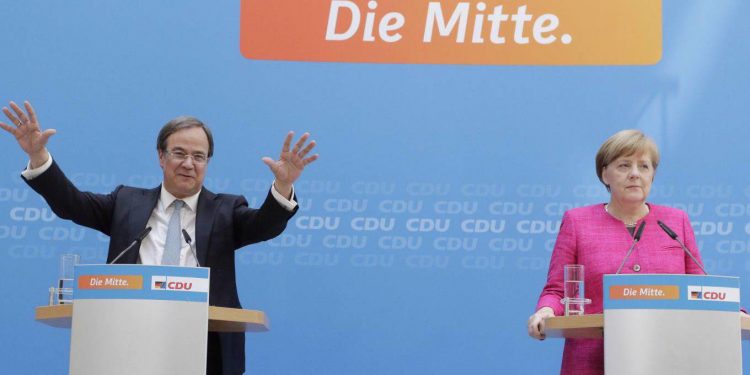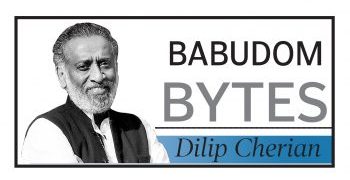Josef Joffe
German Chancellor Angela Merkel’s Christian Democratic Union (CDU) has ruled the 71-year-old Federal Republic for a total of 50 years. When she steps down next fall after 16 years in office, it is safe to assume that another Christian Democrat will succeed her. Who will it be?
Within the next few weeks, the CDU will hold its 33rd party convention, and choose a new leader. Whoever it is will most likely be anointed as the CDU’s candidate for chancellor when Merkel steps down, and there is little doubt that the CDU will come out on top in next September’s general election, whereupon it will take the lead in forming the next government.
The three men vying for the party’s top job are not household names abroad. The first (going in alphabetical order) is Armin Laschet, the minister-president of North Rhine-Westphalia and a longtime party workhorse whose charisma does not match his competence.
Next is Friedrich Merz, who led the CDU caucus in the Bundestag two decades ago, until he was driven out by Merkel as she prepared her own run to the top. After slinking off to the private sector and making oodles of money, he is pushing for a comeback.
The third contender is Norbert Röttgen, the chairman of the Bundestag’s Foreign Affairs Committee. He served a brief stint as environment minister under Merkel until she fired her then-fair-haired boy.
Laschet is Merkel’s unspoken favourite, if only because the other two have accounts to settle with ‘Mutti’ (mom), whose path to power is strewn with the corpses of not-so-steely rivals. Owing to COVID-19, we don’t yet know when and how the CDU will choose its next leader. But whether it meets physically or virtually, the party will decide this month on a convention date in mid-January.
There is no real front-runner. Merz commanded 27 per cent support in one recent poll, but he was trending downward. Röttgen had 16 per cent and is enjoying a slight uptick. Laschet trails both, and the 21 per cent of respondents checking ‘None of the Above’ have added to the uncertainty.
An obvious question is what each of the candidates stands for. But this is not easy to answer in such a boringly – and perhaps fortunately – centrist political system. The German far left and far right together can claim only around 20 per cent in the polls. Most voters opt for the major parties (above all, the CDU), which operate like supermarkets, offering a little of something for everyone, with no surprises or disruptions.
Throughout the first half of the twentieth century – from Kaiser Wilhelm II to the Führer – Germany was the most ‘interesting’ country in the world. Internally, it was a political volcano, and a deadly threat to its neighbourhood. Today, as a result of two catastrophic world wars, it is about as aggressive as a sloth, with its politics hovering between stable and staid.
So, the CDU beauty contest is nothing like the rollercoaster of the Democratic Party’s presidential primary in the United States this year, where Senators Bernie Sanders of Vermont and Elizabeth Warren of Massachusetts pushed a hard-left course. Nor does Germany have a Donald Trump on the scene. The country’s politics is ‘continuity über alles.’
And so, Laschet is running on his experience as minister-president of the most populous of Germany’s 16 states – an advantage Merz and Röttgen lack. His unspoken message amounts to ‘four more years of Merkelism’: no sudden lurches in domestic or foreign policy.
Meanwhile, Merz, who began his campaign holding up the right end of the CDU table (more Atlanticism and free-market economics), has been carefully balancing his cadences. He, too, wants “no rupture,” but he also believes that Germany has “slowed down too much.” So, let’s have it both ways.
Röttgen, the youngest of the three, sounds like the boldest. Touting his credentials as a foreign-policy expert, he wants to be tougher on Russia and China than the other two. But take heart: under his leadership, there would be “neither total continuity, nor a break” with the Merkel era.
Thus, stability will continue to be the name of the German game. There is no right-wing outlier like France’s Marine Le Pen or Italy’s Matteo Salvini, nor is there any radical leftist like Britain’s Jeremy Corbyn, the former leader of the Labour Party. Whereas the US and the UK essentially have two-party governments, Germany, like most of continental Europe, governs through multiparty coalitions that don’t swing radically to and fro with every election.
In any case, whoever wins the CDU race in January and becomes chancellor in September will have to govern in tandem or even in a threesome. Buoyed by the pandemic, which has favoured the powers that be, the CDU and its Bavarian sister party, the Christian Social Union (CSU), will presumably secure around 35 per cent of the vote. A bit to the left, the Greens may pick up around 20 per cent, making them a natural coalition partner for the CDU/CSU.
This balance-of-power arrangement promises continuity, which is not particularly exciting. We in the media might soon look back wistfully at Trump, who, for all his grating flaws, was the most entertaining leader of the twenty-first century. But in these troubled times – with COVID-19 not yet vanquished, and the economy still sinking – sluggish centrism is not the worst outcome for Europe’s anchor power.
In addition to the three declared CDU contenders, there are two dark horses who, instead of going the conventional route – first chairman, then candidate chancellor – are playing a waiting game. Maybe the party will get bored with the trio of Laschet, Merz, and Röttgen, and will want somebody who is in the public eye daily. One is Minister of Health Jens Spahn, a hard-working politico who, thanks to COVID-19, is constantly in the news. The other is CSU leader Markus Söder, a man of burning ambition who tirelessly works the interview and talk-show circuit. But none of these five candidates would engineer a revolt against Mutti and her legacy. The next German chancellor, it is safe to predict, will be Merkel without the Angela.
The writer, a fellow at Stanford University’s Hoover Institution, serves on the editorial council of the German weekly Die Zeit. ©Project Syndicate.






































